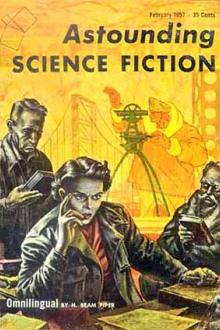A Tale of Two Cities - Charles Dickens (classic books to read .TXT) 📗

- Author: Charles Dickens
Book online «A Tale of Two Cities - Charles Dickens (classic books to read .TXT) 📗». Author Charles Dickens
“I entreat you to tell me more, sir.”
“I will. I am going to. You can bear it?”
“I can bear anything but the uncertainty you leave me in at this moment.”
“You speak collectedly, and you—are collected. That’s good!” (Though his manner was less satisfied than his words.) “A matter of business. Regard it as a matter of business—business that must be done. Now if this doctor’s wife, though a lady of great courage and spirit, had suffered so intensely from this cause before her little child was born—”
“The little child was a daughter, sir.”
“A daughter. A-a-matter of business—don’t be distressed. Miss, if the poor lady had suffered so intensely before her little child was born, that she came to the determination of sparing the poor child the inheritance of any part of the agony she had known the pains of, by rearing her in the belief that her father was dead—No, don’t kneel! In Heaven’s name why should you kneel to me!”
“For the truth. O dear, good, compassionate sir, for the truth!”
“A—a matter of business. You confuse me, and how can I transact business if I am confused? Let us be clearheaded. If you could kindly mention now, for instance, what nine times ninepence are, or how many shillings in twenty guineas, it would be so encouraging. I should be so much more at my ease about your state of mind.”
Without directly answering to this appeal, she sat so still when he had very gently raised her, and the hands that had not ceased to clasp his wrists were so much more steady than they had been, that she communicated some reassurance to Mr. Jarvis Lorry.
“That’s right, that’s right. Courage! Business! You have business before you; useful business. Miss Manette, your mother took this course with you. And when she died—I believe brokenhearted—having never slackened her unavailing search for your father, she left you, at two years old, to grow to be blooming, beautiful, and happy, without the dark cloud upon you of living in uncertainty whether your father soon wore his heart out in prison, or wasted there through many lingering years.”
As he said the words he looked down, with an admiring pity, on the flowing golden hair; as if he pictured to himself that it might have been already tinged with grey.
“You know that your parents had no great possession, and that what they had was secured to your mother and to you. There has been no new discovery, of money, or of any other property; but—”
He felt his wrist held closer, and he stopped. The expression in the forehead, which had so particularly attracted his notice, and which was now immovable, had deepened into one of pain and horror.
“But he has been—been found. He is alive. Greatly changed, it is too probable; almost a wreck, it is possible; though we will hope the best. Still, alive. Your father has been taken to the house of an old servant in Paris, and we are going there: I, to identify him if I can: you, to restore him to life, love, duty, rest, comfort.”
A shiver ran through her frame, and from it through his. She said, in a low, distinct, awestricken voice, as if she were saying it in a dream,
“I am going to see his Ghost! It will be his Ghost—not him!”
Mr. Lorry quietly chafed the hands that held his arm. “There, there, there! See now, see now! The best and the worst are known to you, now. You are well on your way to the poor wronged gentleman, and, with a fair sea voyage, and a fair land journey, you will be soon at his dear side.”
She repeated in the same tone, sunk to a whisper, “I have been free, I have been happy, yet his Ghost has never haunted me!”
“Only one thing more,” said Mr. Lorry, laying stress upon it as a wholesome means of enforcing her attention: “he has been found under another name; his own, long forgotten or long concealed. It would be worse than useless now to inquire which; worse than useless to seek to know whether he has been for years overlooked, or always designedly held prisoner. It would be worse than useless now to make any inquiries, because it would be dangerous. Better not to mention the subject, anywhere or in any way, and to remove him—for a while at all events—out of France. Even I, safe as an Englishman, and even Tellson’s, important as they are to French credit, avoid all naming of the matter. I carry about me, not a scrap of writing openly referring to it. This is a secret service altogether. My credentials, entries, and memoranda, are all comprehended in the one line, ‘Recalled to Life’; which may mean anything. But what is the matter! She doesn’t notice a word! Miss Manette!”
Perfectly still and silent, and not even fallen back in her chair, she sat under his hand, utterly insensible; with her eyes open and fixed upon him, and with that last expression looking as if it were carved or branded into her forehead. So close was her hold upon his arm, that he feared to detach himself lest he should hurt her; therefore he called out loudly for assistance without moving.
A wild-looking woman, whom even in





Comments (0)